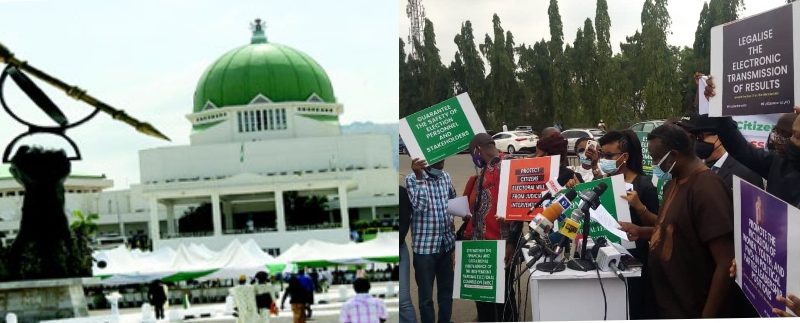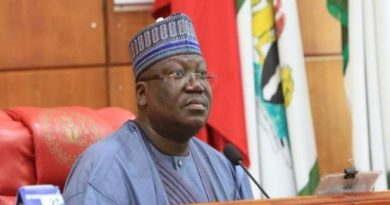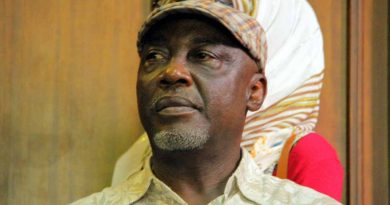ELECTORAL REFORMS: STAKEHOLDERS DEMAND IMMEDIATE PASS OF BILL BY NASS
Oru Leonard
A group of Civil Rights Organisations interested in electoral reforms has called on the National Assembly (NASS), to speed up the process for the passage of the Electoral Act Amendment Bill, and also called on President Muhammadu Buhari to speedily assent to the bill and deliver a brand new Electoral Act 2021 to Nigerians ahead of the 2021 Democracy Day celebration on 12 June.
The group converged in front of the National Assembly on today to demand the speedy passage of the Electoral Amendment Bill, noting that the urgent need for reforming the Electoral Legal Framework is founded on the broad-based consensus by relevant stakeholders on the need for a more credible and improved electoral process.
In a statement co-signed by the coveners at NASS, the group recalled that in December 2020, the National Assembly held a Public hearing on the Electoral Act Amendment Bill which provided an opportunity for citizens and stakeholders to participate and make their input to the electoral reform process and the Senate President at the time promised Nigerians a new Electoral Act by March 2021, but that timeline has come and gone.
“The seeming lack of progress in the National Assembly on the Electoral Act Amendment bill is therefore worrisome. Nigerians demand that their elected representatives respond to the urgent need for an electoral legal framework that genuinely strengthens the electoral processes and procedures, promotes inclusivity and addresses impunity.
“The continued delay in concluding the process is reminiscent of the failed process in 2018 and attendant impact on the 2019 General Election”, the group said.
They also recalled that the Ninth National Assembly, under the leadership of the Senate President, Ahmed Lawal and the Speaker of the House of Representatives, Femi Gbajabiamila, promised Nigerians a people-responsive Electoral Act by the first quarter of 2021. We are now in the second quarter of 2021 and the Electoral Act Amendment Bill is yet to be presented for third and final reading in both chambers of the National Assembly, adding that the process is required before the Bill can be transmitted to the President for his assent.
They further emphasized that in considering the Bill, NASS must undertake an in-depth consideration of the citizens’ priority issues to address identified gaps in the current electoral legal framework. These priority issues include:
* Strengthening the financial and operational independence of the Independent National Electoral Commission (INEC);
* Publication of Polling Unit level results by INEC to promote transparency in the result collation and transmission process;
* Protecting the voting rights of the blind and visually impaired voters;
Reducing the cost of nomination of candidates to promote a level playing field for all contestants;
Promoting the inclusion of women, youth, and persons with disability in politics;
* Legitimizing the use of technology in the electoral process with particular emphasis on the biometric voter register, biometric accreditation of voters; electronic voting, electronic collation and transmission of results;
* Ending impunity for electoral offences by the establishment of the Electoral Offences Commission and Tribunal;
Improving election security and promote professionalisation and non-partisanship in the conduct and behaviour of security personnel on election duty;
* Introduction of early/special voting for Nigerians on essential election duty;
* Eliminating the impact of judicial actions on citizens’ will and choices in elections.
They stated that the Ninth Assembly has an obligation to work expeditiously on passing the Electoral Act Amendment Bill 2021 and pass same to the President for assent.
“This is an urgent national priority. Together with Nigerians, we firmly believe that if the current electoral legal framework is not reviewed and reformed, it will have negative impact and consequences for democratic consolidation. The NASS must recognise that passing the Electoral Bill in good time will engender expeditious action by the executive.
“The speedy enactment of the Bill will give the Independent National Electoral Commission (INEC), the legal clarity to adequately plan and efficiently conduct future elections, particularly the Anambra governorship election scheduled for 6 November 2021″, the group concluded.
The group include: Centre for Citizens with Disability (CCD); Centre for Democracy and Development (CDD); CLEEN Foundation; Inclusive Friends Association (IFA); Institute for Media and Society (IMS); International Press Centre (IPC); Kimpact Development Initiative (KDI); National Institute for Policy and Strategic Studies (NIPSS); Nigerian Women’s Trust Fund (NWTF);
Others are; Peering Advocacy and Advancement Centre in Africa (PAACA); Policy and Legal Advocacy Centre (PLAC); Premium Times Centre for Investigative Journalism (PTCIJ); The Albino Foundation (TAF); and Yiaga Africa.




